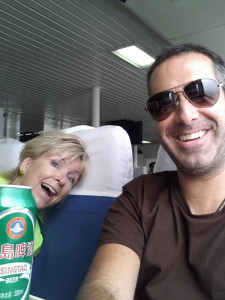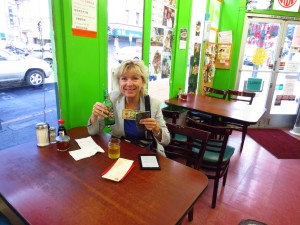HAVE!
I love English but sometimes its over-reliance on certain words to describe wildly different things irks me. Take the word have. While it’s nowhere near the top word, as in the word with the most definitions, namely set (439 definitions) it’s still a bother when it comes to learning Cantonese.
In the photo above I’m having a beer. In Cantonese I’m drinking beer. Isn’t that, dare I say, more logical? In English you can have food, have a cup of tea and have no idea. When you have a party it can both mean going to a party and hosting a party. And where do you have that cup of tea? In your gob? Under the bed? In your pocket?
In Chinese you eat food,(食嘢 – sek yeh), drink beer(飲啤酒 – yam beh jau), go toparty(去party – heui party) and 唔知 (m ji – don’t know) or 乜都唔知 (mat dou m ji – don’t know anything at all).
What I’m saying is: When you’re talking Cantonese with the Cantos, don’t think what the expression would be in English. Always think: What’s the action here? One thing’s for sure, it’s seldom have.

Having a beer and a good time! 玩得好開心(wan dak hou hoisam – playing well happily)
And yet, 有冇 (yau mou – have/not have) is probably the most important expression in the language. But more about that tomorrow! Now I’m going to “have dim sum” (去飲茶 - heui yam cha; go drink tea) with my dear Flying Eagle 飛鷹 (Fei Yeng), a man for whom I have great affection. 我鍾意佢 (o jung yi keui – I like him).

